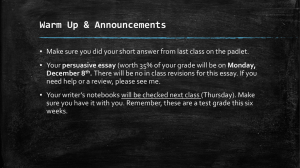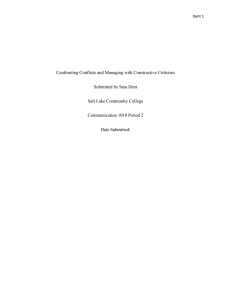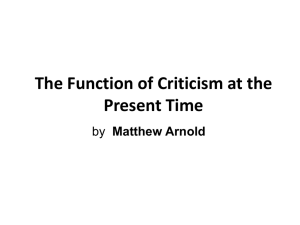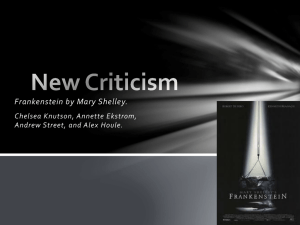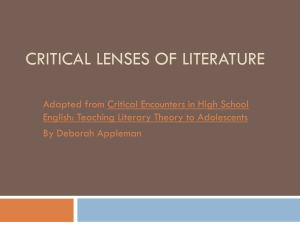Constructive Criticism
advertisement
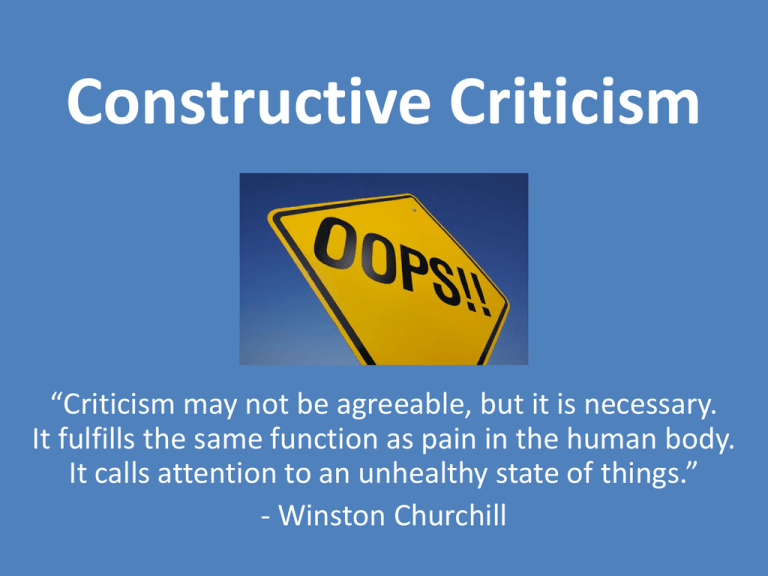
Constructive Criticism “Criticism may not be agreeable, but it is necessary. It fulfills the same function as pain in the human body. It calls attention to an unhealthy state of things.” - Winston Churchill What is Constructive Criticism? • Feedback about someone else’s work – Valid and well-reasoned opinions – Includes both positive and negative comments – Friendly manner rather than an oppositional one • Valuable tool in raising and maintaining performance standards Constructive vs. Destructive Criticism Constructive Criticism Destructive Criticism • Intends to educate • Related to the work • Helps build on an idea • Intends to embarrass • Feels like a personal attack • Tears down an idea • Makes the outcome better • Is intelligent and calculated • Makes the person feel worse • Includes rapid-fire and random responses • Comes along to help • Tries to take over Constructive Criticism in College • Communication styles differ in college • High school teachers – Goal is to increase self-esteem and correct errors – May be less direct when giving feedback or assessing work • College professors – Goal is to correct errors and increase proficiency – More direct or straightforward in feedback – May not mention what was done well Understanding the Intent of Criticism • Constructive criticism may be interpreted as a personal attack if you don’t understand its purpose • However, professors are not launching a personal attack by giving you direct feedback – No vendetta against students – Their job is to make you a stronger critical thinker, a better writer, and a more knowledgeable person – They have the benefit of experience and perspective to offer you quality feedback and advice – You will not improve without hearing where you went wrong and how to correct it Prepare Yourself for this Change • Start preparing now for the shift in feedback styles you will encounter in college in order to… – Alleviate culture shock – Receive feedback in the spirit in which it’s intended – Learn from criticism more quickly • Use the following tips to help you process constructive criticism and become more “thickskinned” Tips for Processing Constructive Criticism 1. 2. 3. 4. Stop Separate the content from the delivery Reflect and use it as a learning experience Acknowledge your feelings, but don’t take it personally 5. Learn something and move on Stop • Do not react or respond immediately • Take a deep breath or count to 10, if necessary Separate the Content of the Message from the Manner in which It Is Delivered • Feedback in college will usually be professional and appropriate • Some criticism may be delivered with emotion such as frustration, anger, or sarcasm • Keep your cool and stay rational – Don’t match the other person’s emotions – Reacting negatively or emotionally generally makes the situation worse • Address the underlying issue, not the way it’s being raised Reflect Upon and Learn From the Feedback • What is the content of the message that was conveyed? • Move past defensiveness to genuinely analyze the feedback • Was the criticism justified? To what extent? – If so, how can you improve? – If not, what else can you learn from the situation? Acknowledge Your Feelings, But Don’t Take It Personally • Some criticism may have a big impact on you – It may sometimes be personal, and it often feels personal – It’s ok to feel hurt, angry, sad, disappointed, stung, surprised, or whatever else • However, don’t let it… – Bring you to a standstill – Define you – Lower your self-esteem • Remember: Nobody’s perfect! Learn Something and Move On • Take the lesson away from the experience, but leave the negative feelings in the past • Use it as a challenge to get better • Use what you’ve learned so you don’t repeat the same mistakes This work is licensed under a Creative Commons Attribution-NonCommercial 3.0 Unported License.



